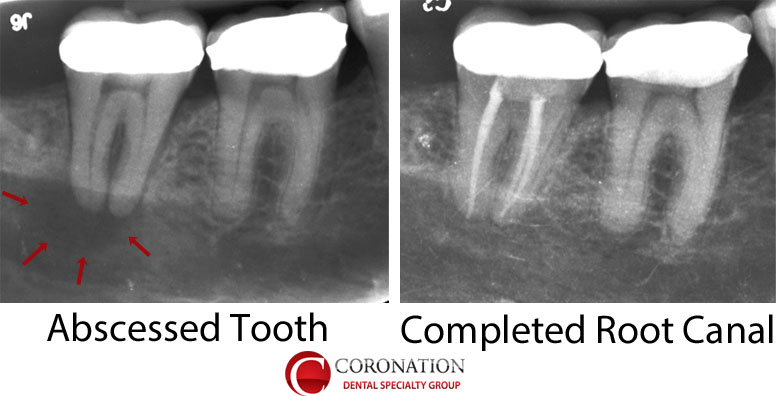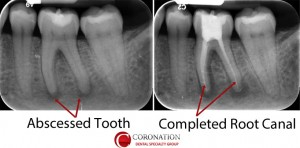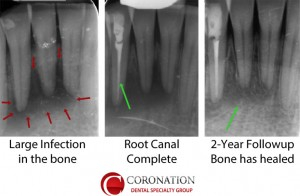Services > Endodontics > Root Canal Treatment
If a tooth develops deep decay, deep or leaking fillings, or suffers a crack or trauma, the tooth may die and need root canal treatment. Root canal treatment is performed when the tissue living inside the tooth (the pulp) becomes inflamed or infected, and may sometimes abscess.
Symptoms that can be experienced include spontaneous and long-lasting pain, pain on chewing, along with hot and cold sensitivity. If the tooth is also infected and abscessed, there may be swelling of the gum tissue around the tooth; pus may occasionally come out from the gum tissue as well. Abscessed teeth that are not treated can cause severe infections in the face and jaws, and in rare cases can spread throughout the body.

Abscess beneath the tooth (red arrows) that resolves after the tooth undergoes successful root canal treatment.
Should the nerve in the tooth become infected or die off, your dentist may recommend saving the tooth with a root canal. Many people ask: “What is a root canal? A Root canal is the process of cleaning inflamed and infected tissue from within the tooth. Following the removal of the diseased pulp tissue, the tooth is filled and sealed with an inert material; this appears white on an x-ray. Treatments may be completed in one appointment, or may span several appointments.

Infection beneath the tooth (dark areas beneath the tooth roots) indicating that root canal treatment is required.
Following treatment, the symptoms will usually resolve, as the source of the problem (the dying or infected pulp tissue) has been removed. The abscess on the tooth will typically resolve, and the tooth symptoms the tooth had been experiencing should begin to improve.

Large infection in bone that resolved after root canal treatment. 2-year long-term follow-up demonstrates bone healing after root canal treatment.
After treatment is completed, patients should return to their dentist as soon as possible for re-evaluation. Many times, the tooth will require a new crown or filling to protect it, and to restore esthetics and function.
If you’re concerned that you need a root canal on your tooth, speak with your dentist about having an evaluation, or contact us to set up a consultation appointment. Our dental specialists in root canals will be happy to speak with you.